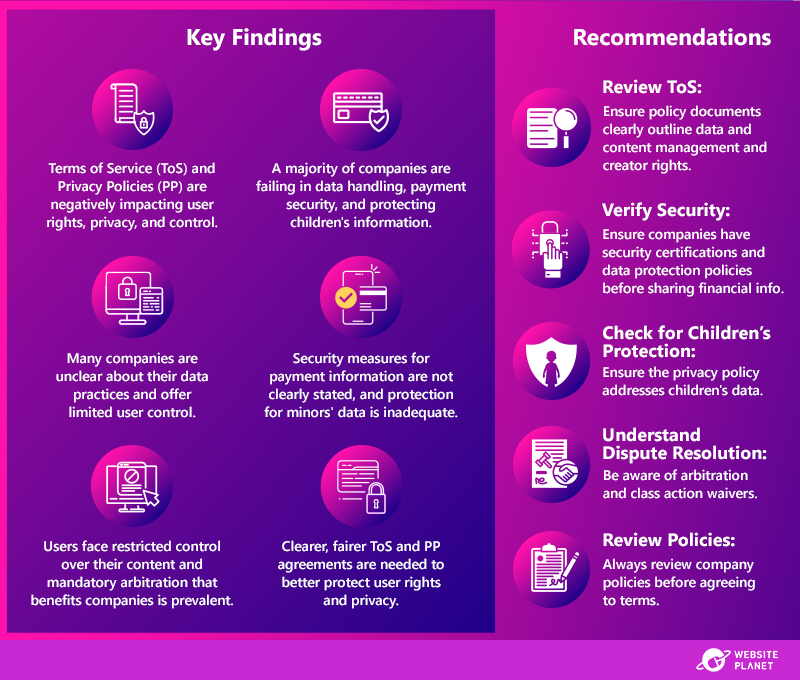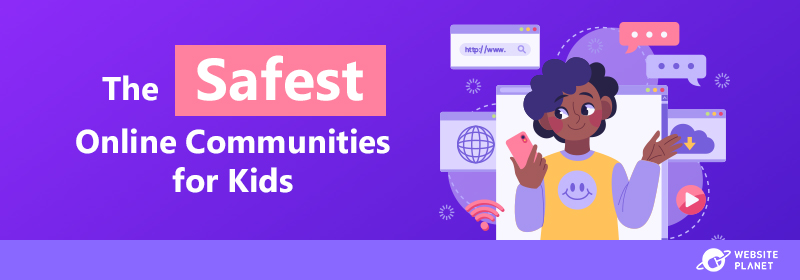Inside this Article
- Finding the best Coursera courses
- Registering for a Coursera course
- How the Coursera learning platform works
- Coursera Pricing
What Is Coursera?
Coursera is an online course platform that offers online learning in conjunction with some of the best universities around. The online training ranges from short courses (also known as Massive Open Online Courses, or MOOCs) to specializations in particular topics and online degrees, so there’s a wide range to choose from. Coursera’s faculty are expert instructors from top universities, so the quality of instruction is high. Since some of the world’s best-known firms use Coursera for employee training, you can be pretty sure you’re getting the job skills you need, too. All courses are delivered completely online, with a combination of videos, text, downloads, and quizzes to test your knowledge.
Coursera’s faculty are expert instructors from top universities, so the quality of instruction is high. Since some of the world’s best-known firms use Coursera for employee training, you can be pretty sure you’re getting the job skills you need, too. All courses are delivered completely online, with a combination of videos, text, downloads, and quizzes to test your knowledge.
Exploring the Coursera Course Catalog
Your starting point for finding a course of study on Coursera is the course catalog. This includes certificate and degree courses accredited by universities. Coursera divides its courses into five types:- Courses: Simple, auto and peer-graded courses with a Coursera certificate upon completion
- Specializations: A group of courses designed to help you master a career skill, which incorporates practical projects
- Professional Certificates: Training for job skills to help you get experience or prepare for industry certification
- MasterTrack Certificates: Courses that give you career credentials and count toward an online degree, including real-world projects
- Degrees: Modular degree learning, allowing you to earn your degree from the comfort of your home and at your own pace
What Can You Study on Coursera?
When you delve into the Coursera course catalog, you’ll immediately notice there’s a lot on offer. The catalog includes courses in arts and humanities, sciences, business, IT, languages, personal development, and more.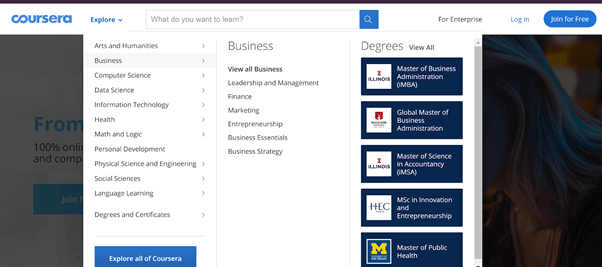 Each main subject is broken into subtopics, giving dozens of possible course options. Whether you want to learn about health and wellbeing or computer algorithms, there’s an online learning program for you.
Many of the subject areas offer both single courses and the option for full degrees, and you can see which courses are part of a degree program on the course listings page. Language courses are generally delivered by institutions based in the country of origin.
Course listing pages include trending and popular courses, certificates, and programs, just in case you’re not sure where to start.
Each main subject is broken into subtopics, giving dozens of possible course options. Whether you want to learn about health and wellbeing or computer algorithms, there’s an online learning program for you.
Many of the subject areas offer both single courses and the option for full degrees, and you can see which courses are part of a degree program on the course listings page. Language courses are generally delivered by institutions based in the country of origin.
Course listing pages include trending and popular courses, certificates, and programs, just in case you’re not sure where to start.
How to Find the Best Coursera Courses
One thing I like about Coursera is that it has excellent on-site filtering tools. These help you find your perfect course in just a couple of clicks. You can refine the courses shown by skills, job title, level, language, type, and creator. Another great feature is that language isn’t a barrier to taking a Coursera course. Many of the courses in English offer subtitles in multiple languages like Spanish, Arabic, and more. This information is available on the course description page, along with details on:
Another great feature is that language isn’t a barrier to taking a Coursera course. Many of the courses in English offer subtitles in multiple languages like Spanish, Arabic, and more. This information is available on the course description page, along with details on:- Duration
- Level
- Deadlines
- Whether it’s part of a specialization or a degree
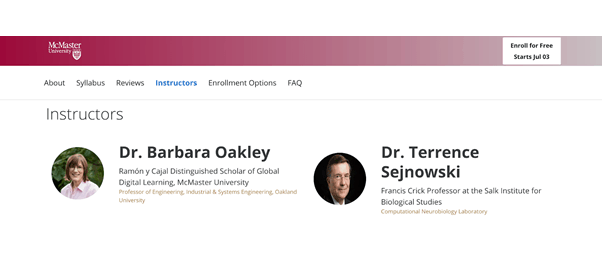 Course pages also include:
Course pages also include:- FAQs
- Skills you’ll learn
- Stats on student success, including career benefits
How Much Does Coursera Cost?
One of the big questions – obviously – is how much this upscale online training is going to cost you. Well, the Coursera price varies considerably, depending on what you’re studying and how you study. You can audit tons of courses on Coursera for free. This gives you access to most course material, but you won’t be graded or earn a certificate. Alternatively, you can take the graded version of the course and get a certificate upon completion. Most courses we saw were for around $100, but pricing did vary. Specializations, which include multiple courses, are available by monthly subscription, and can soon add up for courses that last several months (or depending how long it takes you to complete the materials).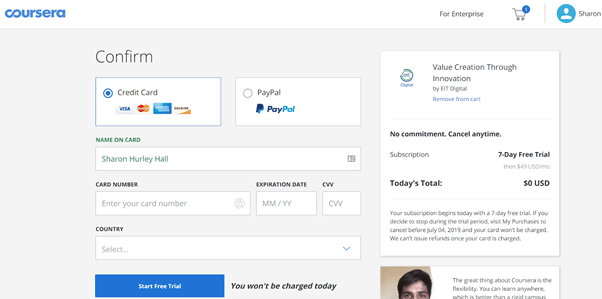 There is some good news, though: Coursera offers a seven-day money-back guarantee. This lets you check out the full course experience, complete with grading, for free.
So far, so good. But what’s it like when you actually sign up for a course?
There is some good news, though: Coursera offers a seven-day money-back guarantee. This lets you check out the full course experience, complete with grading, for free.
So far, so good. But what’s it like when you actually sign up for a course?
How Does the Coursera Learning Platform Work?
To get started, I used the filtering features described earlier to search for a course on marketing. Though I was happy with the filters for language, course level, and topic, it would’ve been nice to have a filter for course duration, so I could match my choice to the time I had available. Eventually, I found a course titled Marketing Strategy for Entrepreneurs. That course is part of the Value Creation Through Innovation specialization.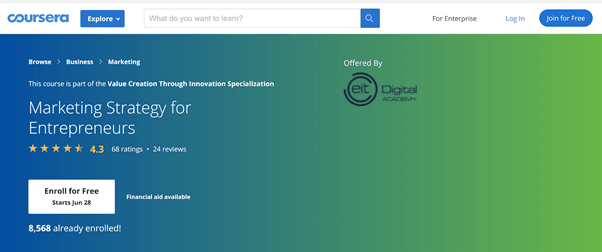
Signing Up – A Simple Process
Filling in the signup form was simple enough, and I appreciated the offer for a seven-day free trial. However, I wasn’t thrilled about having to enter my credit card information to access the trial, so I opted to audit the course instead. That still left me with the option of paying later to get a certificate for the course, and to be credited for completing that part of the specialization.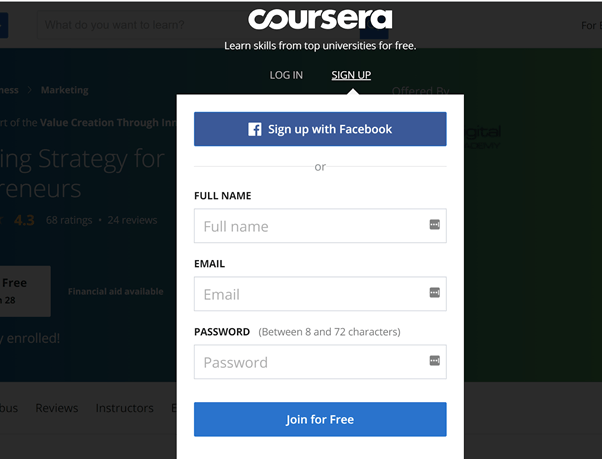 After signing up, I got several emails from Coursera. In addition to an identity verification email, there were three welcome emails: one for the site, and two for the course. That seemed like overkill to me. I think post-signup email messaging could be streamlined.
After signing up, I got several emails from Coursera. In addition to an identity verification email, there were three welcome emails: one for the site, and two for the course. That seemed like overkill to me. I think post-signup email messaging could be streamlined.
Managing Your Time – Easy Calendar Integration
Once I was in the course, there was the option to add course deadlines to my calendar. It was also clear that I could choose to work at my own pace. One thing I really didn’t enjoy was the excessive upselling, since I had literally just said no to that.Course Organization – Handy Overview on Tap
Course content was pretty well organized, with a menu of lessons, grades, notes, and discussions down the left-hand column. The main course page had a welcome message from the course tutor, highlighting important features like where to get help.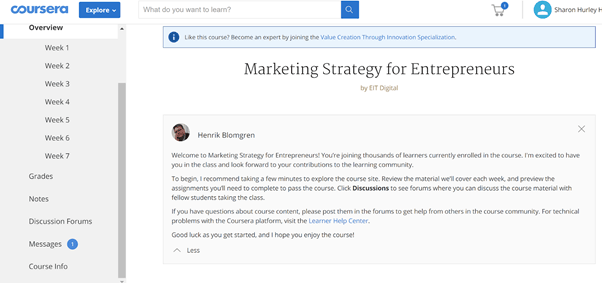 The overview page included a handy guide to the expected duration of the course in a timeline interface with the weekly requirements. I liked the fact that the start and end date were clearly laid out.
The overview page included a handy guide to the expected duration of the course in a timeline interface with the weekly requirements. I liked the fact that the start and end date were clearly laid out.
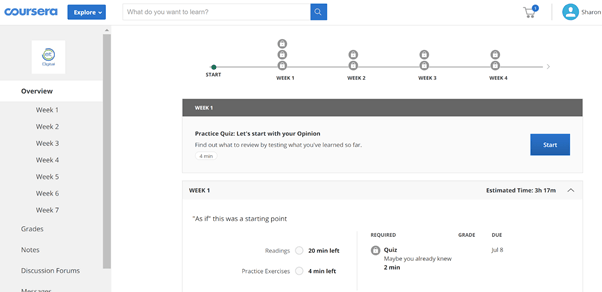 There was also an inbox for on-site communication. I was surprised to see a message there, but it turned out to just be from the course tutor highlighting the first lesson video.
There was also an inbox for on-site communication. I was surprised to see a message there, but it turned out to just be from the course tutor highlighting the first lesson video.
Navigating a Coursera Course
Marketing Strategy for Entrepreneurs started with a two-question practice quiz to assess your base knowledge. As well as being useful for instructors, this helps students get used to how quizzes work on Coursera.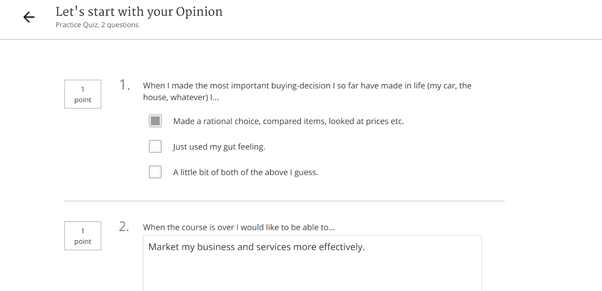 Once you finish a quiz, you get an immediate grade, then there’s a handy button to take you to whatever’s next.
Once you finish a quiz, you get an immediate grade, then there’s a handy button to take you to whatever’s next.
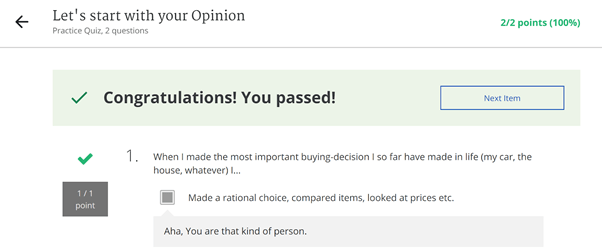 As you finish each section, you can mark it as complete, and rate it with a thumbs up or thumbs down. Then there’s a prompt to move on to the next item.
As you finish each section, you can mark it as complete, and rate it with a thumbs up or thumbs down. Then there’s a prompt to move on to the next item.
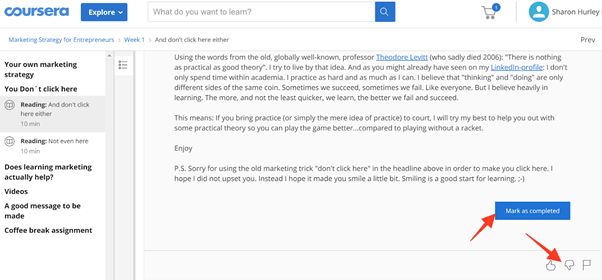 This course was mostly video-based. One thing I liked was that course videos had transcripts. Coursera also allows you to highlight areas of those transcripts and save them as notes. Plus, you can create your own notes within the course interface. All notes are accessible from the main course menu.
Course videos are short and easy to follow. The discussion forums are a good place to get answers to the questions other students have asked in the past. However, some are more active than others. When I checked, it had been more than a month since the last message.
This course also included peer-graded assignments, where students help each other by assessing the work they’ve produced. This seems like a good way to improve engagement and create a learning community for each course.
Overall, I liked the interactive videos, the regular checks of what you’ve learned, and the immediate grading. And once you’ve earned a certificate, you can add it to your professional qualifications on LinkedIn with just a couple of clicks.
This course was mostly video-based. One thing I liked was that course videos had transcripts. Coursera also allows you to highlight areas of those transcripts and save them as notes. Plus, you can create your own notes within the course interface. All notes are accessible from the main course menu.
Course videos are short and easy to follow. The discussion forums are a good place to get answers to the questions other students have asked in the past. However, some are more active than others. When I checked, it had been more than a month since the last message.
This course also included peer-graded assignments, where students help each other by assessing the work they’ve produced. This seems like a good way to improve engagement and create a learning community for each course.
Overall, I liked the interactive videos, the regular checks of what you’ve learned, and the immediate grading. And once you’ve earned a certificate, you can add it to your professional qualifications on LinkedIn with just a couple of clicks.



![Online Course Comparison – Fiverr Learn vs Udemy vs Coursera [2025]](https://dt2sdf0db8zob.cloudfront.net/wp-content/uploads/2019/05/Fiverr-Learn-vs-Coursera-vs-Udemy-850x435.jpg)
![Online Course Comparison – Fiverr Learn vs Udemy vs Coursera [2025]](https://dt2sdf0db8zob.cloudfront.net/wp-content/uploads/2019/03/dale-cudmore.png)







